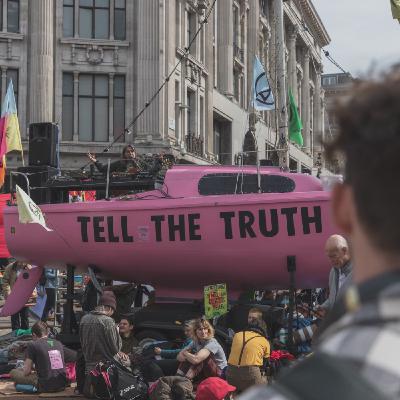Discover Transforming Society podcast
Transforming Society podcast

Transforming Society podcast
Author: Bristol University Press
Subscribed: 41Played: 685Subscribe
Share
© All rights reserved
Description
Brought to you by Bristol University Press and Policy Press, the Transforming Society podcast brings you conversations with our authors around social justice and global social challenges.We get to grips with the story their research tells, with a focus on the specific ways in which it could transform society for the better.
Hosted on Acast. See acast.com/privacy for more information.
148 Episodes
Reverse
Each January, the Bulletin of the Atomic Scientists adjusts the hands of its Doomsday Clock to signal how close humanity stands to catastrophe. At the end of the Cold War, the clock was set at 17 minutes to midnight. Today, it is at just 89 seconds – its closest-ever setting. In this episode of the podcast, George Miller speaks to Patricia Shamai, Principal Lecturer in International Relations at the University of Portsmouth and author of What Are Nuclear Weapons For? They discuss why nuclear weapons have drifted from public consciousness since the 1990s, even as thousands of warheads remain in existence, major powers modernise their arsenals, and new technologies make the strategic picture yet more complex. The conversation also touches on Vladimir Putin’s nuclear posture during the war in Ukraine, the challenges posed by strategic ambiguity, and whether – despite all this – there are any grounds for cautious optimism.Patricia Shamai is Principal Lecturer in International Relations and Associate Head of School in the Faculty of Humanities and Social Sciences at the University of Portsmouth.Find out more about the book at: https://bristoluniversitypress.co.uk/trade/what-are-nuclear-weapons-forThe transcript is available here: https://www.transformingsociety.co.uk/2025/12/19/podcast-89-seconds-to-midnight-why-we-need-to-rethink-nuclear-weapons-now/Timestamps:02:33 - What prompted you to write the book?08:33 - Did reading testimonies of people who experienced the detonations in Japan in 1945 enhance your understanding or change your perception?14:01 - Why is the nuclear weapon picture always changing?23:41 - What is the current climate among nuclear powers more broadly?28:52 - Are there any signs of hope that we can begin to pull that second hand back from midnight?Intro music:Cold by yoitrax | @yoitraxMusic promoted by www.free-stock-music.com Creative Commons Attribution 3.0 Unported Licensecreativecommons.org/licenses/by/3.0/deed.en_US Hosted on Acast. See acast.com/privacy for more information.
Whether we like to admit it or not, we’re all growing older. However, the experience of growing older at work remains surprisingly overlooked and under theorised in management and organisation studies.In this Transforming Business podcast, Martin Parker speaks with Kathleen Riach, author of ‘Working through Ageing’, about her groundbreaking 10-year longitudinal study that offers fresh theoretical and empirical insights into how ageing is experienced in the workplace.They discuss how this fascinating study grew from a conversation in a pub, the way ageing is both universal and unique, and the importance of providing, if not answers then, alternative paths when presenting research. Kathleen Riach is Professor of Organizational Studies at University of Glasgow and Visiting Professor at the Monash Centre for Health Research and Implementation at Monash University.Find out more about the book at: https://bristoluniversitypress.co.uk/working-through-ageingThe transcript is available here: https://www.transformingsociety.co.uk/2025/12/11/podcast-growing-up-and-older-at-work/Timestamps:00:33 - Why are you interested in ageing and work?03:03 - Do you think ageing at work is a more important topic than it used to be?08:14 - Can you talk about your study and how it came about?14:08 - Can you talk about how ageing is universal, but also unique?16:17 - What is the relationship between your work, Simone de Beauvoir and the idea of phenomenology?20:36 - Did this research make you think differently about your own ageing?23:13 - What effect does talking about bodies at work have on policies in organisations?27:55 - Is it difficult to move from critique into a place of action?30:29 - What are your plans next?Intro music:Cold by yoitrax | @yoitraxMusic promoted by www.free-stock-music.com Creative Commons Attribution 3.0 Unported Licensecreativecommons.org/licenses/by/3.0/deed.en_US Hosted on Acast. See acast.com/privacy for more information.
True crime is a huge cultural industry, yet behind its stories lies real victims and uncomfortable ethical implications.In this podcast, Richard Kemp speaks with Ian Cummins and Martin King, two of the authors of ‘True Crime: Key Themes and Perspectives’, about the impact true crime has on society.They discuss Serial, the groundbreaking podcast, and how it sparked the industry anew, the media’s reaction to the Lucy Letby case, and the wider issue of using crime stories to push sales and clicks.Ian Cummins is Senior Lecturer in the School of Health and Society at the University of Salford. Martin King is an independent scholar and author.Find out more about the book at: https://bristoluniversitypress.co.uk/true-crimeThe transcript is available here: https://www.transformingsociety.co.uk/2025/12/04/podcast-how-true-crime-stories-shape-society/Timestamps:00:01:55 - Why does true crime fascinate us?00:08:27 - What is the importance of 'In Cold Blood' by Truman Capote?00:11:14 - What effects does the interplay between fact and fiction in true crime have?00:19:10 - What is the relationship between the Central Park Five and true crime media?00:28:25 - What does the reverence of famous serial killers tell us about our culture's values?00:42:59 - What ethical issues do podcasts like Serial have?00:53:34 - What do cases like Sutcliffe tell us about our collective attitude towards violence against women?00:57:31 - What does the media coverage of the Lucy Letby case tell us about our media landscape?01:08:33 - Does our celebritisation of criminals pose issues, and how could we change things going forward?Intro music:Cold by yoitrax | @yoitraxMusic promoted by www.free-stock-music.com Creative Commons Attribution 3.0 Unported Licensecreativecommons.org/licenses/by/3.0/deed.en_US Hosted on Acast. See acast.com/privacy for more information.
In this episode of the podcast, N.J. Enfield, professor of linguistics at the University of Sydney, joins George Miller to discuss 'What Is Truth For?' — a book that sees truth not as a battlefield but as a shared practice of collaboration, error correction and trust. Together they explore what it takes to keep words and reality aligned when confidence in institutions and expertise is low and misinformation rife.N. J. Enfield is professor of linguistics at the University of Sydney.Find out more about the book at: https://bristoluniversitypress.co.uk/trade/what-is-truth-forThe transcript is available here: https://www.transformingsociety.co.uk/2025/11/26/podcast-is-there-snow-on-mount-everest-why-truth-still-matters/Timestamps:01:33 - Has there been a shift in 'The Truth' over the last 20 or so years?05:59 - Can you tell us about the 'Fighting Truth Decay' project?09:03 - What does a linguist bring to a project like this that's different from other specialists?13:56 - Is the truth always going to be contingent and to some degree subjective? 28:58 - What do you make of the apparent loss of credibility accorded to institutions such as universities? 33:43 - What about people who have very different belief systems from our own?41:01 - How do you retain your optimism and what would you say to someone so that they don't themselves give up hope?Intro music:Cold by yoitrax | @yoitraxMusic promoted by www.free-stock-music.com Creative Commons Attribution 3.0 Unported Licensecreativecommons.org/licenses/by/3.0/deed.en_US Hosted on Acast. See acast.com/privacy for more information.
Have you ever been part of an HR investigation? Whether you were the subject, the investigator or simply an outside observer, there is growing evidence of the significant harm they can cause. In this episode of our Transforming Business podcast series with Martin Parker, Andrew Cooper and Adrian Neal, editors of ‘Under Investigation: Transforming Disciplinary Practice in the Workplace’, discuss the issues with these processes. They explore the impact employee investigations can have on organisational culture and show that prioritising employee wellbeing, alongside the application of these processes, is not only possible but essential.Andrew Cooper is the Head of Programmes for Employee Wellbeing in Aneurin Bevan University Health Board in NHS Wales. Adrian Neal is the Head of Employee Wellbeing in Aneurin Bevan University Health Board in NHS Wales and a Consultant Psychologist.Find out more about the book at: https://bristoluniversitypress.co.uk/professional-business/under-investigationThe transcript is available here: https://www.transformingsociety.co.uk/2025/11/11/podcast-when-hr-hurts-why-workplace-discipline-needs-a-rethink/Timestamps:1:23 - What is your book doing?2:30 - What potential harms are there, outside of the person going through the process?6:19 - What angles are you both approaching this issue from?8:17 - What stories stand out to you?13:19 - What should we be doing instead?17:12 - How does giving voice open these processes for investigation?24:59 - How does scale affect the application of these processes?31:21 - How do these findings apply on a broader scale?35:04 - Who would you like to read this book?Intro music:Cold by yoitrax | @yoitraxMusic promoted by www.free-stock-music.com Creative Commons Attribution 3.0 Unported Licensecreativecommons.org/licenses/by/3.0/deed.en_US Hosted on Acast. See acast.com/privacy for more information.
When you think of people in debt, what do you imagine? Irresponsible people who leave telephones ringing and hide from debt collectors, or people faced with an impossible situation? In this episode, Richard Kemp speaks with Ryan Davey, author of ‘The Personal Life of Debt’, about the true, everyday lives of indebted people. They discuss the people Ryan met during his fieldwork on a southern English housing estate, the reality of living on the ‘never-never’, and what changes, to debt itself and society as a whole, are needed to break this vicious cycle.Find out more about the book at: https://bristoluniversitypress.co.uk/the-personal-life-of-debtThe transcript is available here: https://www.transformingsociety.co.uk/2025/10/24/podcast-are-people-really-to-blame-for-their-debt/Timestamps:1:55 – What was your experience of Woldham during your research?7:52 – Did you experience any class tension?10:07 – How can debt be worse now than during the 2008 financial crash?17:08 – What is ‘living on the never-never’ and what does it mean to different people?25:46 – Are these communities perfect prey for credit?32:19 – How does the rescue mindset of child protection manifest in a place like Woldham?38:35 – What affect did right to buy, and other similar policies, have on working class communities?44:34 – Why would debt advisors have negative views of debtors?51:03 – What changes are needed to break this unending cycle of debt?Intro music:Cold by yoitrax | @yoitraxMusic promoted by www.free-stock-music.com Creative Commons Attribution 3.0 Unported Licensecreativecommons.org/licenses/by/3.0/deed.en_US Hosted on Acast. See acast.com/privacy for more information.
We often hear that working-class boys in education are misogynistic, aggressive and unwilling to learn. But how true is this? In this episode, Richard Kemp speaks with Alex Blower, author of ‘Lost Boys: How Education is Failing Young Working-Class Men’, about how the education system often fails these boys. They discuss the role of masculinity in the lives of working-class boys and men, Alex’s personal experiences with being working-class and a young carer, and why we need to stop focusing on perceived individual failures and instead turn our attention to the troubled relationship between these boys and the systems in which they reside.Listen to the episode to get 50% off the paperback and eBook until 20 October 2025.Alex Blower is Research Fellow at Arts University Bournemouth. Find out more about the book at: https://policy.bristoluniversitypress.co.uk/lost-boysThe transcript is available here: https://www.transformingsociety.co.uk/2025/10/03/podcast-how-education-is-failing-young-working-class-men/Timestamps:01:32 - Can you tell us about your upbringing and experiences of education?08:08 - What consequences have occurred from political leaders pointing to working-class boys themselves as the problem?11:43 - Does this have an effect on the recent polarisation and marches?14:02 - Did your feelings of aspiration change when you changed schools?17:22 - Should schools be providing more diverse avenues for future progression?20:42 - What is the working-class identity now?24:51 - What inequalities are there and how are they perpetuated even by people with first-hand experience?29:17 - Can you explain the caring roles that young working-class people have to take on, and how the education system is letting them down?35:56 - What did you learn from the Being a Boy project?39:11 - What is Boys’ Impact? And what changes do you hope to achieve from this work?Intro music:Cold by yoitrax | @yoitraxMusic promoted by www.free-stock-music.com Creative Commons Attribution 3.0 Unported Licensecreativecommons.org/licenses/by/3.0/deed.en_US Hosted on Acast. See acast.com/privacy for more information.
The goal of drug policy is clear, according to the United Nations, whose convention on narcotic drugs largely sets the framework for what individual states do. The aim, the UN says, is to end the ‘serious evil’ of addiction. This, it adds, is to be achieved by preventing public access to dangerous substances, while at the same time ensuring adequate provision of narcotics to meet medical and scientific need. The challenge of these twin purposes – ensuring availability for medical use, preventing availability for recreational use –encapsulates the ‘dual use dilemma’ that has confronted drug policymakers for the past 150 years, as Julia Buxton, Professor of Justice at Liverpool John Moores University, explains in this episode of the podcast. Julia reflects on how personal experience drew her into the field, why US power has played such a disproportionate role and what happens when countries attempt reform. The conversation explores not only the human costs of criminalisation, but also why it has proved so hard to shift drug policy towards a different, health-led future.Julia Buxton is Professor of Justice at John Moores University in Liverpool and British Academy Global Professor. Find out more about the book at: https://bristoluniversitypress.co.uk/trade/what-is-drug-policy-forThe transcript is available here: https://www.transformingsociety.co.uk/2025/09/17/podcast-drugs-the-path-that-led-to-prohibition/Timestamps:2:19 - Tell me about the challenge of talking about drug policy to such different audiences5:26 - Can you tell us about the story of how you came to study drug policy?8:30 - Has the medicinal use of drugs improved in the past 25 years?12:36 - When do you think it's useful to start looking in the historical record for the first signs of what would become our current global policy towards restricting access to certain drugs?19:28 - What is path dependency in the context of evolving drug policy?22:05 - How influential is the US in this context?30:55 - Can you tell us about efforts to decriminalise some drugs in some countries?41:50 - Are there things that give you a little bit of hope for a better future?Intro music:Cold by yoitrax | @yoitraxMusic promoted by www.free-stock-music.com Creative Commons Attribution 3.0 Unported Licensecreativecommons.org/licenses/by/3.0/deed.en_US Hosted on Acast. See acast.com/privacy for more information.
In many ways neoliberalism is an extreme ideology, much like fascism and communism, but we very rarely recognise it as such. It hides behind the free-market, deregulation and privatisation, but in reality it’s quietly increasing isolation, inequality, poverty, disease and environmental threat.In this episode, Richard Kemp speaks with Peter Beresford, author of ‘The Antidote: How People-Powered Movements Can Renew Politics, Policy and Practice’, about the problem neoliberalism poses, both in politics and in our everyday lives.They discuss how neoliberalism has undermined democracy, the power of new social movements, and what can be done to create a better society for everyone.Peter Beresford OBE is Visiting Professor at the University of East Anglia and Co-Chair of Shaping Our Lives, the national disabled people’s organisation.Find out more about the book at: https://policy.bristoluniversitypress.co.uk/the-antidoteThe transcript is available here: https://www.transformingsociety.co.uk/2025/09/01/podcast-from-faultlines-to-frontlines-neoliberalism-vs-people-powered-movements/Timestamps:2:03 - What is neoliberalism, what make it extreme and how has it clung on for so long?5:06 - How was neoliberalism first sold to us?8:13 - How does neoliberalism affect our day-to-day lives?9:15 - How is the murder of Sarah Everard connected to neoliberalism?18:50 - How did neoliberalism affect COVID-19 responses, and what policies went unscrutinised during the pandemic?24:26 - What are new social movements and what are they doing differently?34:46 - How has neoliberalism shaped digital space, particularly social media?41:14 - How is neoliberalism related to slavery and white privilege?43:53 - Is left-wing populism a danger?47:16 - Why do we need radical changes, and what should these changes be?53:35 - What actions can we, individually, take to move away from neoliberalism?Intro music:Cold by yoitrax | @yoitraxMusic promoted by www.free-stock-music.com Creative Commons Attribution 3.0 Unported Licensecreativecommons.org/licenses/by/3.0/deed.en_US Hosted on Acast. See acast.com/privacy for more information.
Despite claims that we now live in a post-racial society, race continues to disadvantage those from Black and minority ethnic backgrounds.In this episode, Richard Kemp speaks with Kalwant Bhopal, author of the second edition of ‘White Privilege: The myth of a post-racial society’, about why those from black and minority ethnic communities continue to be marginalised.They discuss the backlash against the #BlackLivesMatter movement, the way conversations about race always get sidelined for other elements of the EDI umbrella, and why we must continue to have hope.Kalwant Bhopal is Professor of Education and Social Justice and Director of the Centre for Research on Race and Education at the University of Birmingham.Find out more about the book at: https://policy.bristoluniversitypress.co.uk/trade/white-privilege-1The transcript is available here: https://www.transformingsociety.co.uk/2025/07/22/podcast-has-racism-really-changed-from-black-lives-matter-to-edi-backlash-and-beyond/Timestamps:01:31 - Could you explain the hope that was sparked in 2020 and how it was lost?08:13 - Is this diluting of the narrative conscious?13:59 - What are the unearned assets that white privilege provides?18:25 - What is the relationship between Prevent and racism in schools?21:34 - Has EDI become a hollow buzzword, and how does it perpetuate white privilege?26:31 - How did Donald Trump use his whiteness to achieve re-election?31:59 - Why was the experience of COVID-19 so different for black and minority ethnic groups?38:56 - What can we do to work towards genuine, positive change?Intro music:Cold by yoitrax | @yoitraxMusic promoted by www.free-stock-music.com Creative Commons Attribution 3.0 Unported Licensecreativecommons.org/licenses/by/3.0/deed.en_US Hosted on Acast. See acast.com/privacy for more information.
The welfare state is often talked about as a universal safety net, a system designed to catch anyone who falls. But does that image really capture how different countries understand and organise welfare around the world?In this episode, George Miller talks to Professor Paul Spicker, author of What Is the Welfare State For?, about some of the historical roots, moral foundations, and practical workings of different welfare systems. Drawing on examples ranging from 16th-century Flanders to modern-day India, Paul explores the tension between ideal models and on-the-ground realities – and explains why the British case is far from typical.The conversation touches on cash assistance, healthcare, solidarity, new technology and the role of the private sector – offering insight into what the welfare state is, what it does, and who it’s really for.Paul Spicker is Emeritus Professor of Public Policy in Robert Gordon University, Aberdeen and a writer and commentator on social policy.Find out more about the book at: https://bristoluniversitypress.co.uk/trade/what-is-the-welfare-state-forThe transcript is available here: https://www.transformingsociety.co.uk/2025/07/01/podcast-safety-net-or-patchwork-quilt-getting-to-grips-with-the-welfare-state/Timestamps:00:56 - Can you take us back to the mid-70s and introduce us to who you were then?06:48 - What is the problem with the 'ideal' welfare state?08:17 - How do you define something as nebulous as the welfare state?13:31 - Can you tell us about Ypres in Belgium in the 1530s?24:14 - Why is the welfare state always couched in moral terms?26:40 - To what extent are those debates healthy and inevitable? 33:30 - Are worries about welfare cuts misplaced?40:39 - Is the private sector part of the solution or is it actually part of the problem?43:34 - Is there anything that you've fundamentally changed your mind on since the mid-70s? Intro music:Cold by yoitrax | @yoitraxMusic promoted by www.free-stock-music.com Creative Commons Attribution 3.0 Unported Licensecreativecommons.org/licenses/by/3.0/deed.en_US Hosted on Acast. See acast.com/privacy for more information.
As basic income trials take place around the world, the idea can no longer be dismissed as purely utopian. But can it truly reshape economies and societies?In this episode, Richard Kemp talks with Howard Reed and Elliott Johnson, two of the co-authors of Basic Income: The Policy That Changes Everything, about the reality of basic income. They explore various models of implementation, how such a system could be funded, how it differs from the current welfare framework, and the potential for basic income to create transformative change across society.Howard Reed is Senior Research Fellow in Public Policy at Northumbria University and Director of Landman Economics. Elliott Johnson is Vice-Chancellor’s Fellow in Public Policy at Northumbria University.Find out more about the book at: https://policy.bristoluniversitypress.co.uk/trade/basic-incomeThe transcript is available here: https://www.transformingsociety.co.uk/2025/06/10/podcast-is-basic-income-the-answer-to-our-age-of-crisis/Timestamps:01:34 - What is basic income and how is it different from our current welfare offer?04:19 - Can you talk more about the conditionality of our current welfare and the behaviour it causes?05:55 - Has the welfare situation always been this bad?08:05 - What are the three schemes for basic income?12:26 - Can you explain why people from wealthy families can afford to fail?14:54 - How fiscally different would basic income be for people on the ground?16:53 - What are the wider societal benefits of basic income?22:27 - Why do you call it basic income instead of universal basic income?24:39 - Wouldn't prices just go up if everyone had this extra money?30:26 - How would basic income do better to help child poverty than child benefit?35:26 - What do we need to do, and what's already being done, to help basic income become a reality?Intro music:Cold by yoitrax | @yoitraxMusic promoted by www.free-stock-music.com Creative Commons Attribution 3.0 Unported Licensecreativecommons.org/licenses/by/3.0/deed.en_US Hosted on Acast. See acast.com/privacy for more information.
What does a humanist feel when they gaze up at the stars? In this episode, George Miller speaks to philosopher Richard Norman, author of What Is Humanism For?, about wonder, meaning and morality in a world without God.Their conversation traces Norman’s intellectual journey, from religious upbringing to secular commitment, and explores how humanism answers some of life’s deepest questions — not through divine revelation, but through shared human experience.Along the way, they consider humanist funerals, climate change, artificial intelligence and how a humanist might still feel awe in a godless universe:‘The awe comes from our sense of both our insignificance when confronted with the vastness of the universe — and our connection with it. A sense that we are part of this magnificent universe.’ Richard Norman, BA (Cantab), PhD (London), is a British academic, philosopher and humanist. He is Emeritus Professor of Moral Philosophy at the University of Kent, where he spent most of his career, and a patron of Humanists UK.Find out more about the book at: https://bristoluniversitypress.co.uk/trade/what-is-humanism-forThe transcript is available here: https://www.transformingsociety.co.uk/2025/05/30/podcast-a-humanist-looks-at-the-night-sky/Timestamps:00:58 - What feelings and thoughts does it provoke in a humanist when they look up on a starry night?08:22 - Did you have a religious upbringing?17:13 - When does it become possible to begin to put forward ideas which seriously question Christianity?22:55 - What provides the ethical foundations for humanism? 26:48 - How does that basic foundation then begin to help us with the purpose?32:15 - How does a humanist funeral work?34:59 - Does putting the human at the centre lead to things like climate change?41:05 - What do humanists think about this possible brave new world where we're no longer the most rational creature on the planet?44:14 - What should you do next if you're still curious?Intro music:Cold by yoitrax | @yoitraxMusic promoted by www.free-stock-music.com Creative Commons Attribution 3.0 Unported Licensecreativecommons.org/licenses/by/3.0/deed.en_US Hosted on Acast. See acast.com/privacy for more information.
Within the next 30 years the European workforce will be down by a quarter, upsetting the systems we have had in place for decades. In this episode, Richard Kemp speaks with Giles Merritt, author of 'Timebomb: When Ageing Explodes', about this impending ageing crisis. They discuss the multiple factors that have led us here, as well as what needs to be done to defuse this bomb before it goes off and explodes the European economy.Since his 1978 arrival in the 'Capital of Europe' as a correspondent of the Financial Times, Giles Merritt has specialised in Europe's policy challenges as a journalist and think-tanker. He's often hailed as a 'Brussels institution' by readers of his incisive and often critical commentaries on European politics and economics.Find out more about the book at: https://policy.bristoluniversitypress.co.uk/trade/timebombThe transcript is available here: https://www.transformingsociety.co.uk/2025/05/19/podcast-the-ageing-crisis-that-no-ones-talking-about/Timestamps:1:20 - What is the timebomb and when is it going to go off?6:27 - What happened to our growth and should we be concerned?12:31 - Shouldn't Brexiters be celebrating the lower number of migrants?25:15 - What happened to create this chasm between just two generations?35:31 - What is the truth behind the workforce crisis?42:11 - Has there been any change to fix the upcoming pension crisis?46:40 - Why do billionaires get away with profit diversion? Why can't we tax them properly?52:49 - Do parties like Trump, AFD and Reform actually intend to fix the problem?54:01 - Where should we start to take action against this timebomb?Intro music:Cold by yoitrax | @yoitraxMusic promoted by www.free-stock-music.com Creative Commons Attribution 3.0 Unported Licensecreativecommons.org/licenses/by/3.0/deed.en_US Hosted on Acast. See acast.com/privacy for more information.
With the death of Queen Elizabeth II and the accession of King Charles, Britain has entered a new era — and questions about the future of the monarchy have become more pressing. Does it have a long-term role to play in modern Britain, or is it an anachronism whose days are numbered?In this episode, George Miller talks to Laura Clancy, lecturer in media at Lancaster University and author of the new book What is the Monarchy For?, about the questions she think we should be asking about the monarchy in 21st-century Britain. Their conversation explores the monarchy’s part in perpetuating inequality, its use of soft power, the influence it exerts over media narratives, and whether the institution can keep re-inventing itself while essentially remaining the same.‘The monarchy is doing important work ideologically,’ Laura argues, ‘upholding systems of inequality – even if it’s not authoritarian, even if it seems passive. It’s part of a structure that still shapes who has power and who doesn’t in Britain.’Laura Clancy is a lecturer in media in the sociology department, Lancaster University. Her research focuses on issues of inequality, particularly 'the elites' and the monarchy.Find out more about the book at: https://bristoluniversitypress.co.uk/trade/what-is-the-monarchy-forThe transcript is available here: https://www.transformingsociety.co.uk/2025/05/02/podcast-challenging-the-monarchy-britain-after-elizabeth-ii/Timestamps:02:11 - What sort of attitude did your family have towards the royals?05:49 - What approach did you take to the question of what is the monarchy for, and why?14:10 - Do you think other countries are better for not having a monarchy?16:16 - Did the death of Queen Elizabeth II change the book?23:11 - What are the main motivators for becoming a republic?32:57 - What eye-opening discoveries came from interviewing royal correspondents?39:47 - What do you think about the countervailing force of British exceptionalism?Intro music:Cold by yoitrax | @yoitraxMusic promoted by www.free-stock-music.com Creative Commons Attribution 3.0 Unported Licensecreativecommons.org/licenses/by/3.0/deed.en_US Hosted on Acast. See acast.com/privacy for more information.
There are many truisms about journalism. That it should speak truth to power. That it must be rooted in community. But what do these mean in practice, especially at a time when journalism is facing an unprecedented set of threats – financial, technological, and political? In this episode, George Miller talks to journalist and media commentator Jon Allsop about the challenges confronting journalism today and how he went about exploring them in his new book, What is Journalism For? Their conversation covers journalism’s complex relationship with democracy and power, the impact of declining local news, the evolving role of social media, and whether there's reason for hope amid the crises. Society needs journalism, Jon says, but ‘that is not the same as saying society needs legacy media – large newspapers, cable news networks – and that these things will somehow be preserved in aspic forever, in the current form, and that traditional journalism with its ethical codes and its norms will persist forever.’Jon Allsop writes for the Columbia Journalism Review, editing its flagship “Media Today” newsletter.Find out more about the book at: https://bristoluniversitypress.co.uk/trade/what-is-journalism-forThe transcript is available here: https://www.transformingsociety.co.uk/2025/04/14/podcast-can-journalism-as-we-know-it-survive/Timestamps:01:43 - How do you explain what your job is?05:02 - When you get up in the morning what is your journalistic diet? What is your routine?08:27 - How did you decide the best way to tackle the question of what is journalism for?13:16 - How did you actually approach that process of speaking to fellow journalists?24:05 - Why do journalists sit so low in the league table of trusted professionals?30:02 - How worried should we be about the disappearance of local news? 44:45 - Do you think there is reason to be hopeful even with the changing landscape of journalism?Intro music:Cold by yoitrax | @yoitraxMusic promoted by www.free-stock-music.com Creative Commons Attribution 3.0 Unported Licensecreativecommons.org/licenses/by/3.0/deed.en_US Hosted on Acast. See acast.com/privacy for more information.
Billionaires represent a scourge of economic inequality, but how do they get away with it within our culture?In this episode of our Transforming Business podcast series with Martin Parker, Carl Rhodes, author of ‘Stinking Rich’, explains the dangerous and deceptive myths which portray billionaires as a ‘force for good’.They discuss the myths of the heroic, generous, meritorious and vigilante billionaire, and how their wealth and power is setting us back to old-fashioned feudalism and plutocracy.Hosted by leading organization studies professor Martin Parker (University of Bristol), Transforming Business is a new series from Transforming Society, featuring in-depth conversations with top experts in work, economy, finance, employment, leadership, responsible and sustainable business, innovation, organising and activism. These insightful interviews explore fresh ideas and bold strategies for creating a more ethical and equitable business world. Tune in to challenge conventions, spark innovation and drive meaningful change.Carl Rhodes is Professor of Organization Studies and Dean of the Business School, University of Technology Sydney.Find out more about the book at: https://bristoluniversitypress.co.uk/trade/stinking-richThe transcript is available here: https://www.transformingsociety.co.uk/2025/03/26/podcast-the-myth-of-the-heroic-billionaire/Timestamps:00:31 - What did you want to achieve with this book?01:25 - Why do you think we have an elevated perception of billionaires?05:45 - The myth of the heroic billionaire09:51 - The myth of the generous billionaire14:04 - The myth of the meritorious billionaire19:20 - The myth of the vigilante billionaire26:30 - The importance of writing for a non-academic audienceIntro music:Cold by yoitrax | @yoitraxMusic promoted by www.free-stock-music.com Creative Commons Attribution 3.0 Unported Licensecreativecommons.org/licenses/by/3.0/deed.en_US Hosted on Acast. See acast.com/privacy for more information.
Everybody wants to change the world, but can we actually make a difference? In the first episode of our Transforming Business podcast series with Martin Parker, Jane Holgate and John Page, authors of Changemakers: Radical Strategies for Social Movement Organising, discuss the power of activism and challenge the belief that change is impossible.They explore the distinction between mobilising and organising, the role of optimism in driving social change and how we can actively contribute to meaningful transformation in our communities.Hosted by leading organization studies professor Martin Parker (University of Bristol), Transforming Business is a new series from Transforming Society, featuring in-depth conversations with top experts in work, economy, finance, employment, leadership, responsible and sustainable business, innovation, organising and activism. These insightful interviews explore fresh ideas and bold strategies for creating a more ethical and equitable business world. Tune in to challenge conventions, spark innovation and drive meaningful change.Jane Holgate is Professor of Work and Employment Relations at the University of Leeds and a Trustee of the Ella Baker School of Organising. John Page serves on the committee of the Ella Baker School of Organising.Find out more about the book at: https://policy.bristoluniversitypress.co.uk/trade/changemakersThe transcript is available here: https://www.transformingsociety.co.uk/2025/03/19/podcast-changemaking-and-radical-hope-in-times-of-crisis/Timestamps:01:27 - Why is optimism important when thinking about social change?03:43 - What about people who say this will never change?06:46 - What is the distinction between mobilising and organising?11:02 - What is the metaphor of the spider versus the starfish?14:53 - How do you understand leadership?17:41 - Can you reflect on the idea of giving people a sense they can participate actively in forms of social change?21:12 - Can you talk about the difference between Saul Alinsky and Myles Horton's approaches?27:12 - Who do you hope will buy this book? Who would you like to read it?Intro music:Cold by yoitrax | @yoitraxMusic promoted by www.free-stock-music.com Creative Commons Attribution 3.0 Unported Licensecreativecommons.org/licenses/by/3.0/deed.en_US Hosted on Acast. See acast.com/privacy for more information.
Social work exists in a constant tension between caring and protecting vulnerable people, and the control mechanisms within the broader context social workers operate in. Where are the lines drawn in its dual role as an instrument of the state and an advocate for social justice? In this episode Malcolm Carey and Gurnam Singh, guest editors of the Critical and Radical Social Work special issue on social work and social control, speak with Richard Kemp about this paradox of care and control. They discuss the extreme scrutiny faced by unaccompanied asylum-seeking children, the higher standards parents with a learning disability face and the many ways social workers exercise empathy to work both with, and around, the system to help those who need it the most.Dr Malcolm Carey is Associate Professor in Social Work at Liverpool Hope University. Dr. Gurnam Singh is Associate Professor of Sociology at the University of Warwick. Read the special issue: https://bristoluniversitypressdigital.com/view/journals/crsw/13/1/crsw.13.issue-1.xmlThe transcript is available here: https://www.transformingsociety.co.uk/2025/03/11/podcast-social-work-and-social-control/Timestamps:1:20 - What do you mean when you say these articles are a comprehensive exploration of how social work operates at the intersection of care, control, governance and resistance?3:39 - How has the hollowing out following austerity affected the working classes?6:33 - How does the lack of training for assessing parents with learning disabilities play out in day to day life?11:33 - Where does the culture of holding parents with learning disabilities to higher standards come from?13:15 - Are the demands on social workers effecting whether people want to get into social work as a profession?16:05 - What's fuelling the narrative of the deserving citizen and the undeserving migrant?23:27 - What are support workers doing to support young people against this hostile system?30:00 - How can we ensure that social work is focused on safeguarding and not on perpetuating prejudices over vulnerable people? Intro music:Cold by yoitrax | @yoitraxMusic promoted by www.free-stock-music.com Creative Commons Attribution 3.0 Unported Licensecreativecommons.org/licenses/by/3.0/deed.en_US Hosted on Acast. See acast.com/privacy for more information.
We’ve all blamed PMS on hormones but, despite popular belief, no direct causal link between female sex hormones and PMS has ever been proven. So why does the ‘hormonal woman’ stereotype persist? And how does it fuel outdated, sexist narratives about female health? In this episode, Jess Miles speaks to Sally King, a visiting fellow in menstrual physiology at King’s College London, about the myths and sexist tropes that blame the healthy reproductive body for the female-prevalence of emotional distress and physical pain. They discuss why so much of menstrual health focuses on hormones while overlooking the inflammatory nature of the cycle and what needs to change in healthcare, education and everyday conversations.Sally King is a postdoctoral fellow in menstrual physiology at King’s College London who specialises in integrating biological and sociological research and data concerning menstrual health. Find out more about Sally's book 'Menstrual Myth Busting: The Case of the Hormonal Female' at https://policy.bristoluniversitypress.co.uk/exposing-menstrual-myths For evidence-based information on this topic, Sally's website, Menstrual Matters, is an essential resource: https://www.menstrual-matters.com/The transcript is available here: https://www.transformingsociety.co.uk/2025/02/25/podcast-the-myth-of-the-hormonal-female/Timestamps:1:27 - What's your background?5:29 - Who have you written the book for?6:33 - What's the problem with focusing on hormones?9:18 - What is spontaneous decidualisation?15:30 - What are the myths around menstruation that you challenge?26:21 - Can you tell the analogy with Dwayne the Rock Johnson?29:06 - Can you talk about how these myths are perpetuated?48:18 - What suggestions would you make for improving clinical practice and teaching?50:35 - Can you tell us about Menstrual Matters?Intro music:Cold by yoitrax | @yoitraxMusic promoted by www.free-stock-music.com Creative Commons Attribution 3.0 Unported Licensecreativecommons.org/licenses/by/3.0/deed.en_US Hosted on Acast. See acast.com/privacy for more information.
























